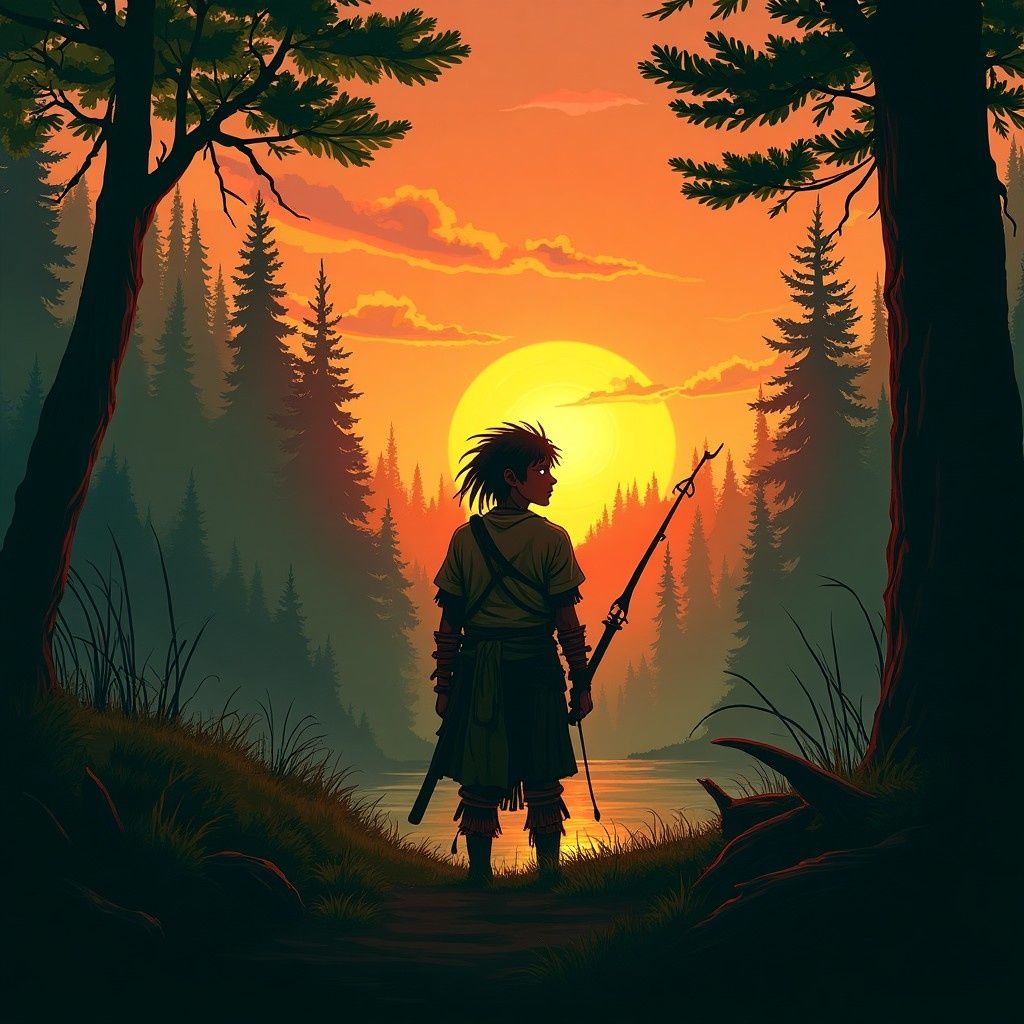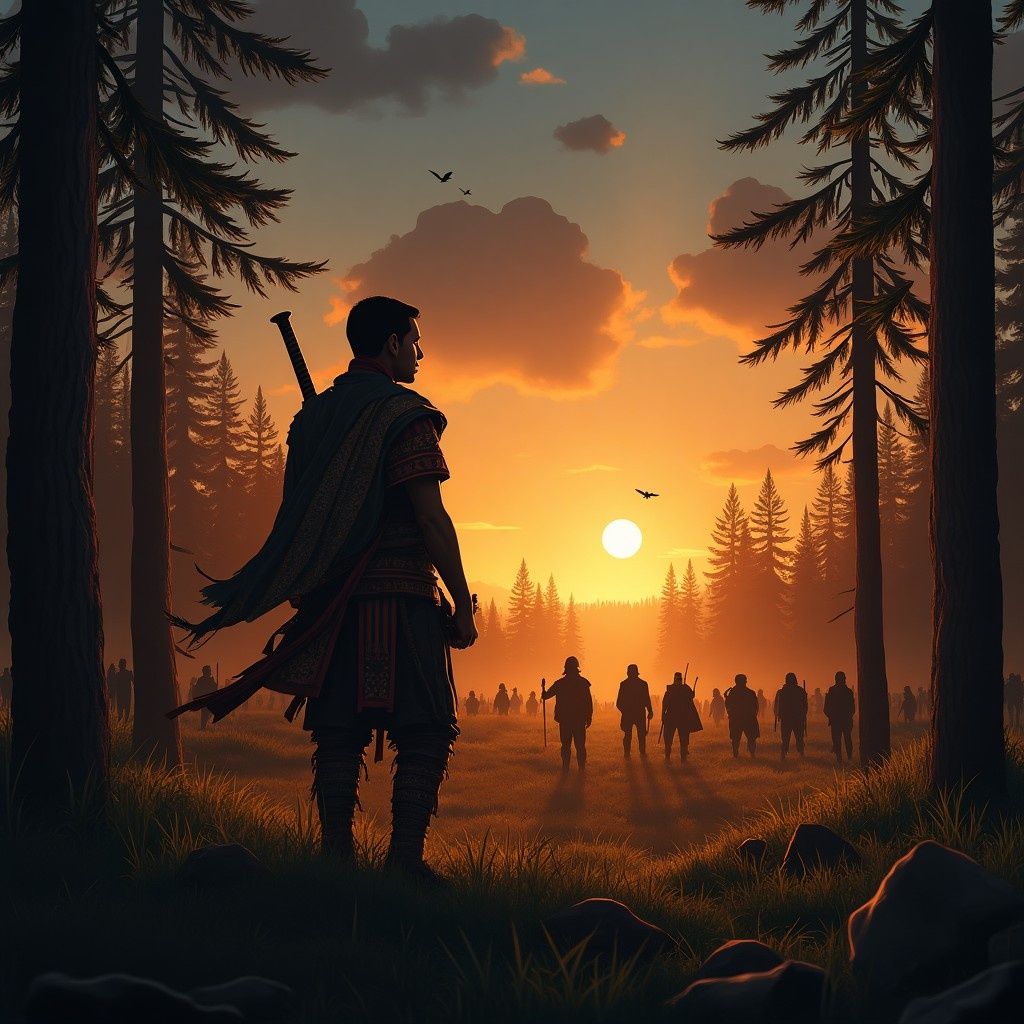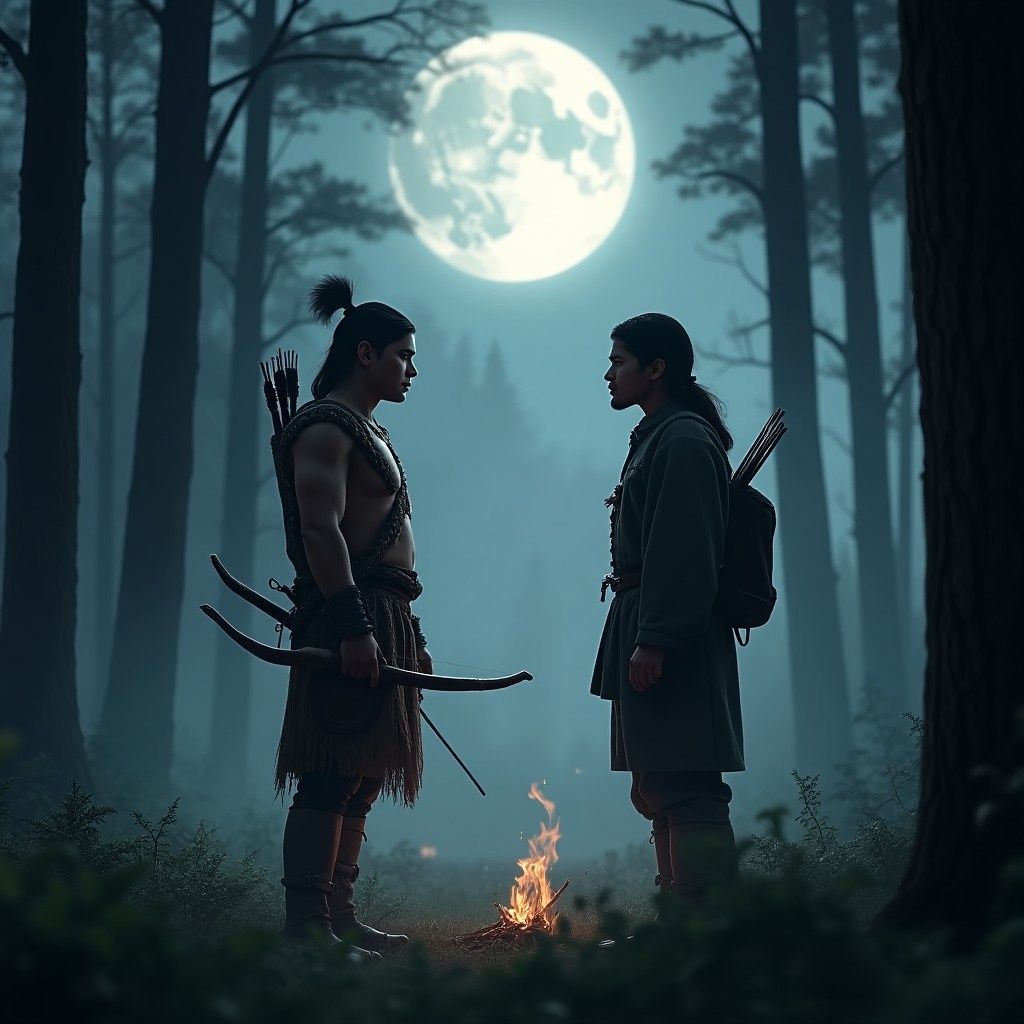The air was thick with the scent of smoke and pine as the sun dipped below the horizon, casting long shadows over the dense forests of Araucanía. The crackling of a distant fire echoed through the trees, a haunting reminder of the battle that had raged just hours before. In the heart of this contested land, where the Mapuche people fought fiercely to defend their home against the encroaching Spanish, a young warrior named Nahuel stood at the edge of a clearing, his heart pounding with a mix of fear and determination.

Nahuel's eyes, dark and intense, scanned the horizon. He was no stranger to the conflict that had consumed his people for decades. Raised on stories of valor and sacrifice, he had long idolized the legendary Mapuche leaders, Lautaro and Caupolicán, whose cunning and bravery had become the stuff of legend. Now, as he stood on the precipice of his own destiny, Nahuel felt the weight of their legacy upon his shoulders. Nearby, the camp was alive with the sounds of preparation. Warriors sharpened their weapons, their faces set with grim resolve. The elders whispered among themselves, their voices a low murmur of strategy and prayer. Nahuel's father, a seasoned warrior with lines of wisdom etched into his weathered face, approached him with a solemn nod. "Tonight, we strike at the heart of the invaders," his father said, his voice steady despite the turmoil that brewed within. "We will show them that the spirit of the Mapuche cannot be broken."

Nahuel nodded, swallowing the lump in his throat. He had trained for this moment, honing his skills with the bow and spear, learning the ways of the forest that had been his people's sanctuary for generations. Yet, as the moment of truth approached, he couldn't shake the feeling of doubt that gnawed at his resolve. As the moon rose high above the treetops, casting a silvery glow over the land, the Mapuche warriors moved silently through the forest, their footsteps a whisper against the earth. Nahuel's heart raced as they neared the Spanish encampment, the flickering light of their fires visible through the trees. The attack was swift and fierce, a blur of movement and sound. Nahuel fought with a ferocity he hadn't known he possessed, his every strike fueled by the memories of his ancestors and the hope for his people's future. Around him, the clash of steel and the cries of battle filled the night, a symphony of chaos and courage.

In the midst of the fray, Nahuel found himself face to face with a young Spanish soldier, his eyes wide with fear and desperation. For a moment, time seemed to stand still as they regarded each other, two young men caught in the throes of a war they hadn't chosen. "Why do you fight?" the soldier gasped, his voice trembling with the weight of his own uncertainty. Nahuel hesitated, the question piercing through the fog of battle. In that instant, he saw not an enemy, but a fellow human being, trapped in a conflict that had claimed too many lives. "For my people," he replied, his voice steady with conviction. "For our land, our freedom." The soldier nodded, a flicker of understanding passing between them before the chaos of battle swept them apart once more. As dawn broke over the blood-stained earth, the Mapuche emerged victorious, their spirits unbroken despite the heavy toll of the night's battle. Nahuel stood among his people, his heart swelling with pride and sorrow. He had fought not just for his ancestors, but for the future of his people, for the hope that one day, they might live in peace. In the days that followed, the story of Nahuel's bravery spread through the land, a testament to the resilience and spirit of the Mapuche. Though the war raged on, with its victories and losses, the memory of that night remained a beacon of hope, a reminder that even in the darkest of times, the human spirit could endure. And so, in the heart of Araucanía, where the forests whispered the tales of old, the Mapuche continued their fight, their hearts aflame with the passion and courage of those who had come before.

Nahuel's eyes, dark and intense, scanned the horizon. He was no stranger to the conflict that had consumed his people for decades. Raised on stories of valor and sacrifice, he had long idolized the legendary Mapuche leaders, Lautaro and Caupolicán, whose cunning and bravery had become the stuff of legend. Now, as he stood on the precipice of his own destiny, Nahuel felt the weight of their legacy upon his shoulders. Nearby, the camp was alive with the sounds of preparation. Warriors sharpened their weapons, their faces set with grim resolve. The elders whispered among themselves, their voices a low murmur of strategy and prayer. Nahuel's father, a seasoned warrior with lines of wisdom etched into his weathered face, approached him with a solemn nod. "Tonight, we strike at the heart of the invaders," his father said, his voice steady despite the turmoil that brewed within. "We will show them that the spirit of the Mapuche cannot be broken."

Nahuel nodded, swallowing the lump in his throat. He had trained for this moment, honing his skills with the bow and spear, learning the ways of the forest that had been his people's sanctuary for generations. Yet, as the moment of truth approached, he couldn't shake the feeling of doubt that gnawed at his resolve. As the moon rose high above the treetops, casting a silvery glow over the land, the Mapuche warriors moved silently through the forest, their footsteps a whisper against the earth. Nahuel's heart raced as they neared the Spanish encampment, the flickering light of their fires visible through the trees. The attack was swift and fierce, a blur of movement and sound. Nahuel fought with a ferocity he hadn't known he possessed, his every strike fueled by the memories of his ancestors and the hope for his people's future. Around him, the clash of steel and the cries of battle filled the night, a symphony of chaos and courage.

In the midst of the fray, Nahuel found himself face to face with a young Spanish soldier, his eyes wide with fear and desperation. For a moment, time seemed to stand still as they regarded each other, two young men caught in the throes of a war they hadn't chosen. "Why do you fight?" the soldier gasped, his voice trembling with the weight of his own uncertainty. Nahuel hesitated, the question piercing through the fog of battle. In that instant, he saw not an enemy, but a fellow human being, trapped in a conflict that had claimed too many lives. "For my people," he replied, his voice steady with conviction. "For our land, our freedom." The soldier nodded, a flicker of understanding passing between them before the chaos of battle swept them apart once more. As dawn broke over the blood-stained earth, the Mapuche emerged victorious, their spirits unbroken despite the heavy toll of the night's battle. Nahuel stood among his people, his heart swelling with pride and sorrow. He had fought not just for his ancestors, but for the future of his people, for the hope that one day, they might live in peace. In the days that followed, the story of Nahuel's bravery spread through the land, a testament to the resilience and spirit of the Mapuche. Though the war raged on, with its victories and losses, the memory of that night remained a beacon of hope, a reminder that even in the darkest of times, the human spirit could endure. And so, in the heart of Araucanía, where the forests whispered the tales of old, the Mapuche continued their fight, their hearts aflame with the passion and courage of those who had come before.
The Arauco War was a protracted conflict between Spanish colonizers and the Mapuche people in the Araucanía region of Chile, beginning in the mid-16th century. It was sparked by Spanish attempts to establish settlements and exploit local resources, particularly gold, using Mapuche labor. The conflict saw various phases, including sieges, raids, and battles, with significant figures like Pedro de Valdivia and Mapuche leaders such as Lautaro and Caupolicán playing pivotal roles. The war led to the destruction of several Spanish settlements and established a clear frontier between Spanish-controlled areas and Mapuche lands. This enduring struggle, marked by fierce resistance and strategic adaptations by the Mapuche, significantly impacted Spanish colonial ambitions and highlighted the resilience of indigenous cultures against European colonization.


Comments
Post a Comment